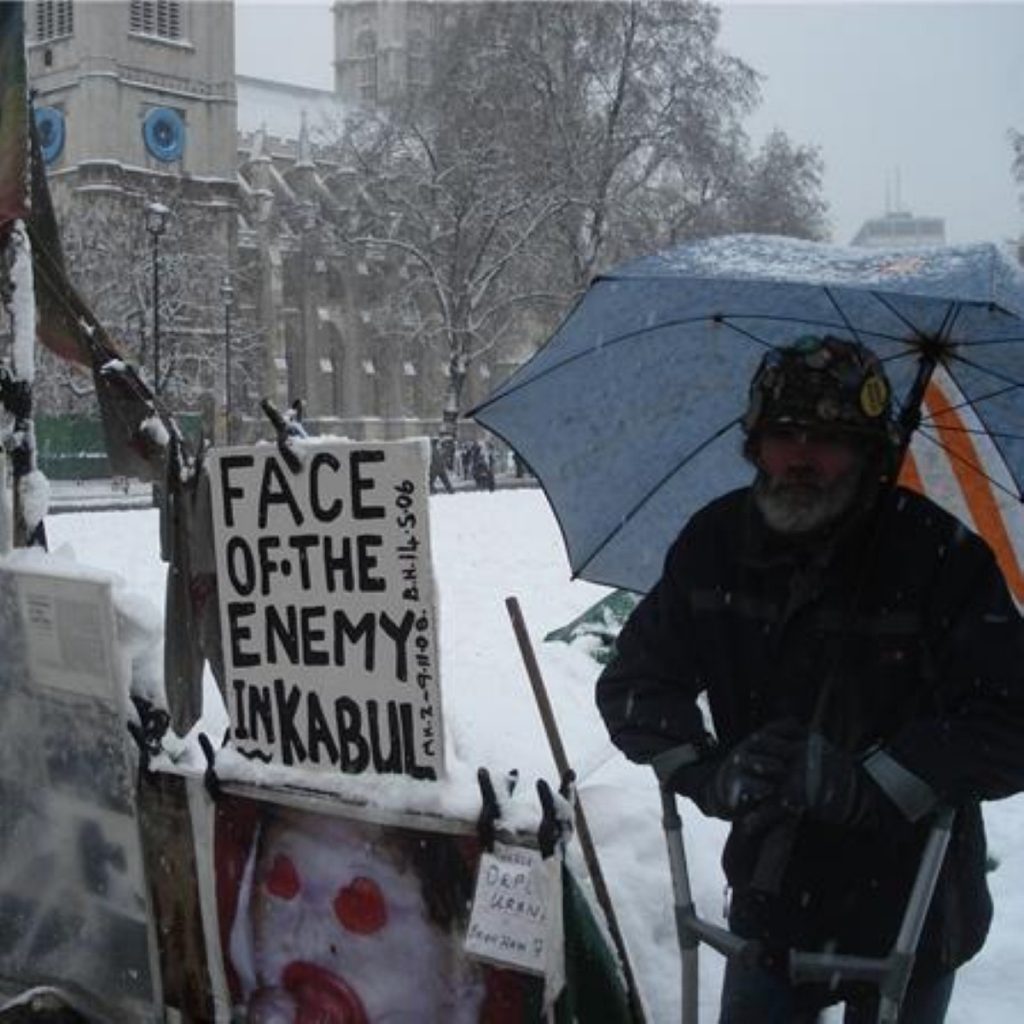Feature: End of an era for Parliament Square
Ten years down the line, protestor Brian Haw’s “squalid encampment” could be entering its final calendar year.
I can see it as I write from politics.co.uk’s warm office in the Houses of Parliament. About 12 or 13 miserable looking tents sit huddled on the hard concrete pavement, broken up by a few waving flags and rows of tired-looking placards. ‘End the corporate war in Afghanistan’, one large billboard says. ‘Listen to the people’ screams another. The protest camp’s been there as long as I’ve worked here, as much a part of the scenery as the endless traffic spewing from Whitehall and Westminster Bridge which separates them from the politicians. If those politicians have their way, it’s not going to be there much longer.
For the Conservatives and Liberal Democrats, those champions of civil liberty, are taking steps to get rid of the protestors for good. Measures contained in the police reform and social responsibility bill, already at its second reading stage in the Commons, will permit officers to “prohibit persons from engaging in certain activities in a specified area of Parliament Square, ie the central garden area and adjoining pavements”. Tents will be prohibited, as will sleeping in them. Constables have the power to “seize and retain prohibited items”.


All of this will be a blow for Brian Haw, the veteran protester who began his angry vigil against the government in 2001. He’s naturally suspicious of anyone who approaches him wearing a suit: in 2005 the government passed a law designed to remove Haw, originally from Redditch in Worcestershire, but the high court ruled the Serious Organised Crime and Police (SOCP) Act 2005 could not be applied retrospectively against him. I managed to persuade him to bark some contemptuous words during the heavy snowfalls of February 2009. It was a freezing day of blizzards which had left parliament, like the rest of central London, deserted. “While the world dies, a few of them in there are staying at home because it’s a bit uncomfortable,” Haw said. Behind him his tent was a foot deep in snow; you can’t help but admire the man’s resilience. I was feeling a bit chilly myself, so quickly retreated back to the warmth.
Haw may be able to resist the extreme weather which even Parliament Square ends up being exposed to, but his defiance of his political enemies now seems limited. “They’ve tried everything they can to get rid of us. They’re doing everything they can,” Haw added back in 2009.
“We’ve been down this road. But we are campaigning against genocide, infanticide and torture.”
A quick confession: among the “prohibited items” will also be loudhailers. A part of me is frankly delighted at this. It’s hard enough writing copy in a busy newsroom without having the drone of a protestor shouting at you. Something about the acoustics of this place makes it seem as if the shouting protestors are sitting two feet away from you, nagging into your ear. ‘Listen to the people!’ the placard demands. Parliament’s politicians learned to screen out that particular person a long time ago.
But that doesn’t mean they should all be delighted by the change, which is the result of years of nagging by the Tories. Grandees like Sir Patrick Cormack have called for it to be scrapped, for it should not be allowed to “permanently disfigure the centre of our great capital city”. Alan Duncan, when shadow leader of the Commons, said the “grotty eyesore” was a “national embarrassment” and a “total abuse of the legitimate right to protest”. There will be gloating in the tearooms when Haw is given his marching orders. Now the Conservatives are in power they are acting quickly to remove the protest entirely. The Home Office states: “The aim behind the new legal framework is to prevent Parliament Square being taken over exclusively by individuals or groups and to ensure that it remains available to all as a public space, including protestors.” While it opposes permanent encampments, it is also scrapping sections of the Serious Organised Crime and Police (SOCP) Act 2005 which means spontaneous protests in Parliament Square will not be challenged by police.
Will this take some of the spice out of unscheduled raids on the Square, as occurred in last December’s student protests demonstration? With the unions predicting 12 months of unrest, 2011 could be an interesting year to find out.
(politics.co.uk has been based in parliament’s press gallery since 2009 but is part of SquareDigital‘s family of consumer websites based in London’s Canary Wharf.)

